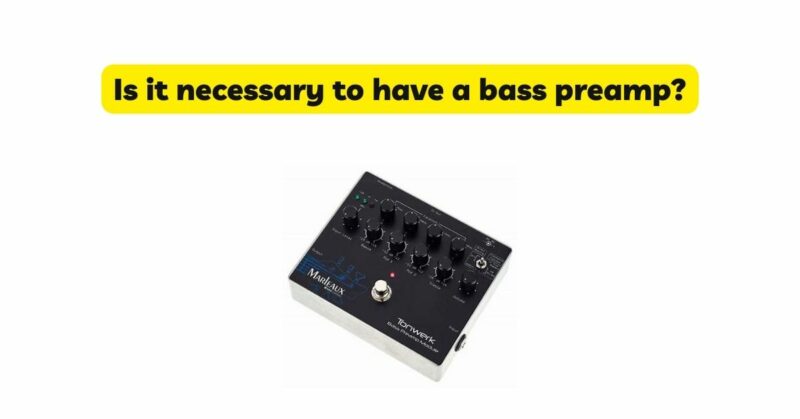When it comes to building a comprehensive bass rig, musicians often contemplate the need for a bass preamp. While many bass amplifiers already include a preamp section, some bassists wonder if a standalone bass preamp is necessary to enhance their sound. In this article, we will delve into the world of bass preamps, exploring their functions, benefits, and whether they are truly essential for bass players.
Understanding the Bass Preamp: A bass preamp is an electronic device that processes the signal from the bass guitar before it reaches the amplifier. It typically resides between the instrument and the amplifier, providing tonal shaping and signal conditioning. The primary purpose of a preamp is to amplify the low-level signal from the bass guitar to a line level suitable for the power amplifier. Additionally, preamps offer various tone-shaping controls such as EQ, gain, and sometimes compression, allowing musicians to shape their desired bass tone.
Benefits of a Bass Preamp:
- Tone Shaping: A significant advantage of using a bass preamp is the ability to shape and fine-tune your bass tone. With dedicated EQ controls, bassists can adjust the frequency response to emphasize specific frequencies or sculpt their sound to fit different musical genres and playing styles. The ability to dial in your desired tone can greatly enhance your playing experience and provide greater control over your sound.
- Versatility: Bass preamps often provide a wide range of tonal options, allowing bassists to experiment with different sonic characteristics. Whether you prefer a warm vintage sound, a punchy modern tone, or anything in between, a bass preamp can help you achieve the desired sonic signature. The versatility offered by a preamp can be particularly beneficial for musicians who perform various styles of music and require flexibility in their sound.
- Signal Boosting: Bass preamps offer signal boosting capabilities, allowing bassists to increase the overall volume of their instrument. This feature can be particularly useful in live performance situations where a stronger signal is needed to cut through the mix or compensate for long cable runs. The ability to boost your signal can provide added clarity and ensure that your bass lines are heard prominently.
- Noise Reduction: Many bass preamps incorporate noise reduction circuits, helping to minimize unwanted hum, hiss, and interference. This feature enhances the overall signal quality and ensures a clean and noise-free bass tone. By reducing noise, a preamp can provide a more professional and polished sound, especially in recording or studio environments.
Necessity of a Bass Preamp: While bass preamps offer undeniable benefits, their necessity depends on various factors:
- Amplifier Capabilities: Some bass amplifiers already include a built-in preamp section that provides tone shaping and signal conditioning. If you are satisfied with the tonal options and functionality of your amplifier’s preamp, a standalone bass preamp may not be necessary. However, if you find that your amplifier’s preamp lacks certain features or does not deliver the desired tone, a dedicated preamp can be a valuable addition to your setup.
- Playing Style and Musical Genre: The necessity of a bass preamp also depends on your playing style and the musical genres you typically perform. If you require precise tonal control and frequently switch between different sonic characteristics, a dedicated bass preamp can offer more flexibility and customization. Musicians who play in genres that demand specific tonal characteristics, such as funk, metal, or jazz, may find a preamp essential for achieving the desired sound.
- Budget Considerations: Acquiring a bass preamp involves an additional cost. If budget constraints are a concern, it may be more practical to invest in other aspects of your bass rig, such as a better instrument, amplifier, or effects pedals, before considering a standalone preamp. It is important to evaluate your priorities and allocate your resources accordingly.
- Personal Preferences: Ultimately, the necessity of a bass preamp is subjective. Some bassists may find that a preamp significantly enhances their tone and overall playing experience, while others may achieve satisfactory results without one. Experimentation and personal preference play a significant role in determining whether a bass preamp is essential for your setup. If you are passionate about shaping your sound and have a strong desire for tonal control, a bass preamp can be a valuable tool.
Conclusion: While a bass preamp offers a range of benefits such as tone shaping, versatility, signal boosting, and noise reduction, its necessity depends on several factors. The capabilities of your amplifier’s built-in preamp, your playing style, musical genre, budget considerations, and personal preferences all come into play when deciding whether to invest in a standalone bass preamp. Ultimately, it is essential to consider your specific needs and goals as a bassist and carefully evaluate how a bass preamp fits into your overall bass rig setup. Whether you choose to incorporate a bass preamp or rely solely on your amplifier’s preamp, the most important aspect is to create a sound that inspires you and complements your musical expression.


